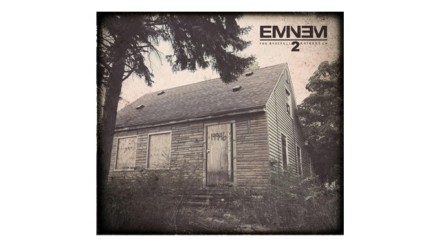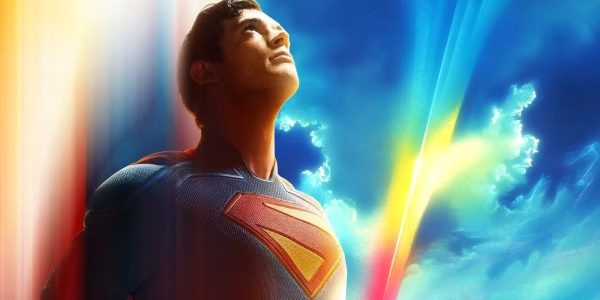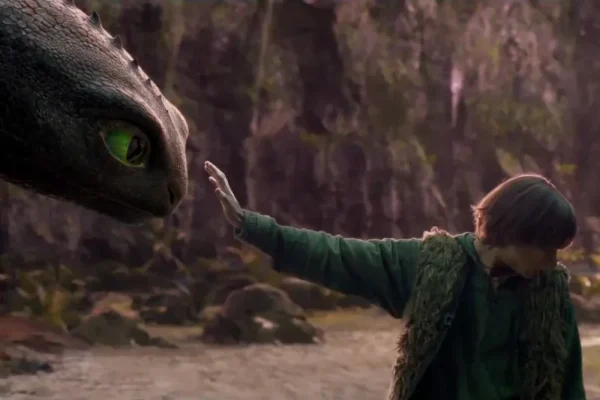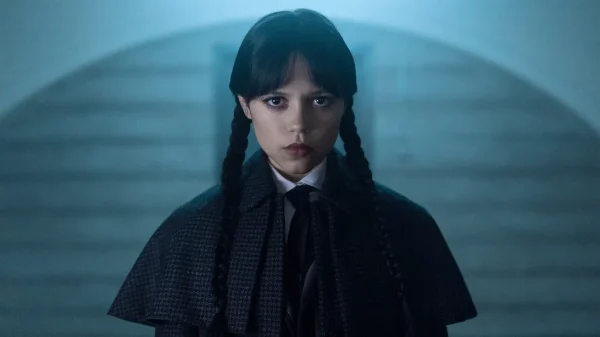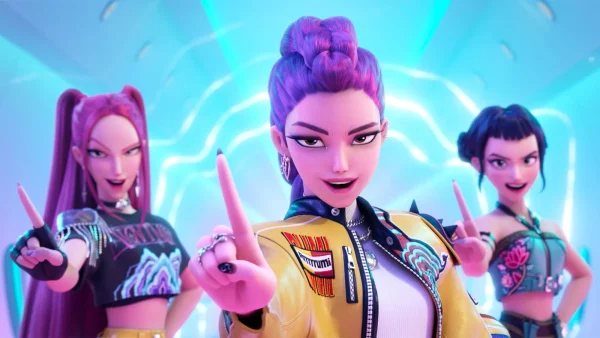‘MM LP 2’ features ‘mature’ Eminem
I think it’s a fair statement to make that Marshall Bruce Mathers III is one of the best rappers alive. The man’s incredibly nimble on the mic, and not only is he one of the best punchline rappers (“Scary Movies,” “Bad Meets Evil,” “Role Model”), but he’s also an adept storyteller (“Stan”) with a warped sense of humor and an ability to make even the most outrageous material hilarious despite itself (“As the World Turns”). Heck, it’s not a stretch to say that he is the white rapper.
Which is why I’m worried about Mr. Mathers. Not his health, of course – he’s better than ever on that front, thank you very much – but the music: Ever since he went clean, Eminem … has had a rocky comeback. Neither of his post-rehab albums sucked as hard as Encore, but they had significant problems. For “Relapse,” while the music was good (in fact, some of the best in his career), the album was marred by a lack of focus and an insistence on Em using an accent that made him sound like Professor Closeau’s Pakistani cousin – just kidding, I have no idea what that accent is supposed to be. “Recovery” didn’t have those problems, but it seemed Eminem was under the impression that had the opposite problems: The lyrics were fine, but Em seemed to believe that only by “going pop” could he maintain his popularity, which had the brilliant effect of making Eminem looking like a sellout, which isn’t what you want if your entire early days were the antithesis of “radio-friendly.” Overall, his post-rehab output has put quite a few fans in the awkward position of secretly hoping for a relapse. It seems like a ploy to concerted attempt on Eminem’s part to prove Bill Maher right on his “drugs and art” theory.
Keeping this in mind, I viewed the release of The Marshall Mathers LP 2 with both anticipation and (less) trepidation. I wasn’t really worried about lyrical content, and my ears perked up when I heard DJ Premier, No I.D. and Rick Rubin had been contacted to produce for the album. As for the singles, while “Berzerk” sounded a bit like Slim Shady Redux and “Rap God” doesn’t really fit Eminem’s style, the four singles are generally good on the lyrical front, though with those songs being split into rap-rock (“Berzerk” and “Survival”) and pop (“The Monster,” and “Rap God,” to an extent), the question is whether Marshall’s album will successfully integrate the styles while keeping at the top of his lyrical games – and, more to the point, soundling like a plausible follow up to “The Marshall Mathers LP,” even if it is only a nominal sequel.
“Bad Guy”: The album leads off with a sequel to the “Marshall Mathers LP” song “Stan,” which is easily Eminem’s best and one you should undoubtedly buy regardless of musical preference. However, while the concept is a logical progression – Stan’s little brother Matthew is grown-up and out for revenge – there is a lot of ways this can go terribly wrong (Lil Wayne’s “Dear Annie” being one of the more terrible results), and I’m not going to hold my breath for “Bad Guy” to fully measure up.
The song doesn’t have the same feel as “Stan,” for starters, having a more pop-friendly sound compared to the original – although to be fair, it’s probably just a producer tic; you don’t hear many Top 10 singles with a “Long Red” break.1 (This isn’t actually a single, and even for “Stan” it was mostly popular in other countries; besides cutting the song from 6:44 to 5:33, the US was the only country where “Stan” never got near the Top 20). “Bad Guy” – where Matthew is trying to off Eminem for not responding after Stan died – starts out pretty well, but loses quite a bit of dramatic tension in the second verse, due to Eminem speaking in an ill-advised sneer for the first half. The song manages to regain most of the tension in the next verse, but what elevates the song from “above-average sequel” to great song is the last verse, which is a plot-relevant reflection on Em’s music career – explains the joke, yes, but for once it enhances the song rather than invalidating it. By all rights “Bad Guy” is an OK follow-up, accounting for sequelitis, but as a standalone song, it’s pretty good, and one of the better songs on the album.
“Parking Lot”: This is a follow-up skit from “The Marshall Mathers LP”’s “Criminal,” and I can tell you: You’re not really missing anything, Well, you’re missing one of the most pointlessly offensive verses on that album, and given that this is a skit, you wouldn’t be missing much anyway.
“Rhyme or Reason”: This song samples the soda-popping intro to The “‘Time of the Season,” though the way the sample’s used is more subversive…at least until it (painfully) apes “Season’s” chorus. To its credit, though, the song sounds like something Eminem would normally rap over, and whether or not you’ll like the song depends on how much you like the appropriation (personally, I can take or leave this song). So far, this album seems to be more even than its predecessor (though namely because “Stan” follows one of Eminem’s worst songs, “Kill You”).
“So Much Better”: What’s the point of this song, again? I mean, this song could have had a place on “MMLP,” back when he was fighting with his then-wife Kim, but at this point the only reason Marshall would want to put this on the album is to fulfill his “enrage the moral guardians” quota.2
“Survival”: The second single has a banging rock instrumental, great lyrics, a fiery performance by Eminem, and a female guest appearance that doesn’t seem out of place – in short, it’s the best of New 10s Eminem.
“Legacy”: I like this song slightly better than “Bad Guy,” both because the instrumental works better for a standalone song than a sequel, and because the song’s more consistently good than that song. (This song’s instrumental is more reminiscent of “Stan,” incidentally).
“Track 7”: This is one of the most hard-hitting songs, fitting for the actual song title. To be truthful this song is better than “Rap God:” The lyricism is as self-aware and solid as “Rap God,” but the beat is better and the song isn’t pointlessly offensive. (Only problem is that Skylar Grey adds too much of a pop presence to the song; this will be a recurring theme, by the way).
“Berzerk”: Rick Rubin (of Beastie Boys and “99 Problems” fame) produced this song, which was the album’s lead single. Now, the song does have some old M&M shticks that made me think twice about the album (a Ren and Stimpy reference in 2013? Really?) but the song itself is OK – better as a party track – and I’m glad to report that as of yet my worries of the album being either a regression or pop-pandering so far seem to be unfounded (operative phrase so far).
“Rap God”: This is the other way I worried “MMLP2” was going to sound. Eminem may have had some bad beats before his hiatus (e.g. “Kill You,” “I’m Back,” most of “Encore”), but at least those beats were generally ones you could believe Eminem would choose to rhyme over – for that matter, so were the singles, which were genuine breakout hits rather that obvious pop-chart fodder.
That’s not what we got with “Recovery.” There the singles sounded completely out of place, and as such the received idea was that “Marshall Mathers” thought being “mature” meant “looking for radio airplay” – something Eminem of 2000 would have vomited at the mere thought of. The beat isn’t to my taste, but it isn’t bad and I could see it actually working really well – for a late-2000s rapper, or really any popular rapper except Eminem, and for that matter, Nas. (Why he chose to use this beat over a DJ Premier or Rick Rubin one is a mystery for the ages – maybe he’s waiting to put it on “Hell: The Sequel: The Sequel”). Despite this, Eminem rides the beat effortlessly, and from a technical standpoint the lyrics more or less absolve the beat (rap is a lyrical medium, so good lyrics/average-to-poor beats is generally a better combo than weak lyrics/good beats.3 That is, unless you are working with DJ Premier). In fact this song would be an easy sell if it weren’t for the second verse, which (if you’ve read any reviews of the song on the Internet) isn’t just pointlessly offensive, but amazingly regressive. My verdict on “Rap God” is this: Really good on a technical level, but I can’t recommend it.
“Brainless”: This is the most Eminem-like song I’ve heard on the album, and as such it’s a good enough song, but the music is the real story here.
“Stronger Than Me”: ………
Yeah, I have no idea why Marshall is singing for most of the song either. As expected, this song is grade-A schmaltz (save, perhaps, for the last verse), and normally this would be the part where I would say that I couldn’t stop laughing, but that’s not my style, so look to someone else to provide the humor.
“The Monster”: I actually like this beat better than “Rap God,” but the previous criticism regarding that song still stands: Nice music, but it doesn’t fit on an Eminem album. Can’t begrudge him too much his time, though, since it’s an otherwise good song, and one of the few songs I can openly recommend without getting in hot water – though it only works as a single, not a track.
“So Far…”: I’m pretty sure this song is conclusive evidence that Eminem can only sing if he’s trying to be funny. Not coincidentally, this is where Eminem is at his best, when he’s not taking himself seriously, and this song is, I believe, the perfect convergence of the Marshall Mathers, Slim Shady and Eminem personae.
“Love Game” (featuring Kendrick Lamar): Yes, I’m fully aware that this song is offensive, but I think this song can be given some leeway. It can’t be granted complete absolution, of course, but the situation is so ludicrous that it manages to cross the line twice back to hilarious. (That having been said, I think I’m the only person who’s kind of likes this song).
“Headlights”: It’s nice that Marshall is finally trying to make up with his mom after what? 40-odd years? But the song would be improved if his grief didn’t sound so much like anger (and also if is sounded less like a fun. song, and if he officially erased “Kill You” from his résumé in addition to “Cleaning Out My Closet”). Still a good song though, and it helps that the beat actually fits with the music, unlike a certain ode to a deceased D12 member three years back.
“Evil Twin”: I’m aware that this is another Slim Shady effort, but I don’t mind it as much as “So Much Better,” largely because it’s not offensive just for the sake of teeing people off. That doesn’t mean this is something you’d want middleschoolers listening to, and it’s not as adept as “Brainless.” Still, as an album ending, it could have been worse. (Now if it were the last song of Eminem’s career…)
Deluxe Tracks
“Baby”: If you listen to “Berzerk” and “Love Game,” there’s a moment in each song (the second and first stanzas, respectively) where Eminem takes a mental break for about two or so bars, slowing the song to a crawl. While in each case he gets back on track fast enough for these to be forgotten, in this song he uses a simile that a) is gross enough to distract from the lyrics and b) continues for much longer than necessary, making it nearly impossible to pay attention to the second verse. Which is a shame, because the song is otherwise pretty good.
“Desperation”: This is one of those songs that seems absolutely terrible on paper: a rap/country collaboration, where the only real hip-hop influence is in the drum track? Are you serious? In actuality, however, it plays out very nicely: Eminem fits naturally into a country song, and even though the subject matter (a love-hate relationship with his girlfriend) leaves as much room for venting as hip-hop, he actually holds enough restraint that I can readily recommend this. Be forewarned, though: This is perhaps a once-in-a-lifetime event, since Marshall is apparently retiring after this album.
“Groundhog Day”: I like this song, but there isn’t much I can say about this song without it sounding like a filler response, so I’d just like to point out that the beat sounds like a reworking (not a sample or even interpolation) of The Whispers’ “Hey, Who Really Cares?”4
“Beautiful Pain”: The bad news: About a third of this song is someone singing, and one of the singers is Eminem. The good news: This is a bonus song, so you won’t have to hear this unless you buy the deluxe version.
“Wicked Ways”: I can’t defend this song. OK, I can’t attack it on a lyrical basis, but the X Ambassadors on the hook sound like they’re whining, and the song as a whole is a perfect example of what Max from the blog HipHopIsn’tDead called “a strange amalgam of pop and rap music that shouldn’t exist” (oddly enough the song he was referring to, “Talkin’ 2 Myself,” wasn’t that bad). And the outro is of Eminem’s pervier (and, alas, homosexual) alter ego Ken Kaniff, which lasts for about two-and-a-half minutes and ends with toilet humor. My God, this was a terrible way to end an album.
“FINAL VERDICT”: From a lyrical viewpoint, there’s not a lot wrong with the album. Eminem’s lyrics are more or less consistently good, and as such there’s only one song that really stinks (and that one loses more for regression than anything). Actually, the bigger problem with “The Marshall Mathers LP” is the music. Earlier I said that one of Marshall was under the impression that maturity meant actively courting popular opinion, but now I realize it’s closer to thinking “popular musician” and “pop musician” are the same thing – which isn’t a good thing if the previous album outright rejected that attitude. A few of the songs sound like they could belong on a direct sequel, and about six or seven songs complete the transition musically, but most of the music sounds too Billboard-friendly for comfort (“Bad Guy” in particular), and there’s way more singing than can be justified, especially since it helps move the album toward pop-territory by itself. That having been said, I’m going to recommend this, but only because it’s cheaper to buy the deluxe album rather than a set of singles. 7/10
BEST SONGS: “Survival,” “Legacy,” “So Far,” “Desperation,” “The Monster” (as a single). There’s also “Don’t Front,” a song that’ll show up on the Call of Duty: Ghosts soundtrack and which samples the intro to Black Moons “I Got Cha Opin.” The song may not fit into the album itself (as a matter of fact its sound predates Marshall’s 1996 debut by three years), but the music and lyricism is pure fire. The full song isn’t on YouTube, however, so try downloading the song or wait for the soundtrack.
1. The first part can be considered somber, but sounds more like the pop-radio version of sad music. It would work better if it sounded more like the “Killer’s Lullaby” sample used in O.C.’s “My World.”
2. This is presumably the same logic that leads Eminem to lead off the second verse with “Ant to think I used to think you was the s—,b—-.” You can see why this would be a problem.
3. This is the only reason why Ras Kass and Canibus have careers, and a major factor in why Nas and Eminem can sustain reasonable popularity. Though it should be noted that music was a problem only for 2000s Nas, mainly due to laziness; his first two albums and Life is Good are premier evidence
4. I use the sample name because there’s no way I can refer to the song by name; a quick look on the Internet (WhoSampled.com in particular) should show you what I’m talking about.


![Sophomore Isabelle Gaudry walks through the metal detector, monitored by School Resource Officer Valerie Butler, on Aug. 13. “I think [the students have] been adjusting really well," Butler said. "We've had no issues, no snafus. Everything's been running smoothly, and we've been getting kids to class on time.”](https://westshoreroar.com/wp-content/uploads/2025/08/IMG_9979-1200x800.jpg)



































